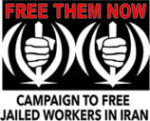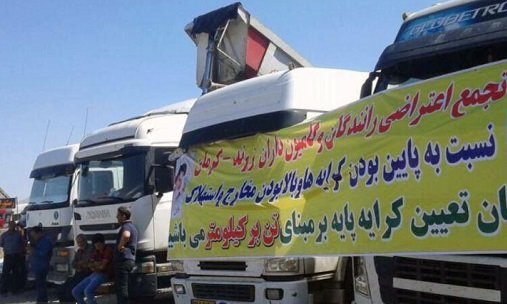The strike is going on in different sectors
The strike of truck drivers, truck owners and tanker drivers started on
November 26 and its scope is getting wider every day. This strike and the wide
range halt of loading at Mahshahr Petrochemical Complex, Iranol Abadan
petrol, Ahvaz Steel, Bandar Abbas Refinery and Shiraz Refinery have disrupted
and stopped the important petrochemical and oil transport mechanism at a large
extent.
The cities and routes where the truck drivers are currently on strike are:
Mashhad, Tehran, Dahaghan, Firouzkooh, Shiraz, Isfahan, trucks carrying
materials and products in Isfahan Steel Company, Shahin Shahr, Shapur and
other parts of Isfahan province, , Abadan, Yazd, Qom, Jolfa to Marand, Shiraz
(refinery and other places), Kazeroon, Khorramabad, Kermanshah, Islamabad,
Shahreza, Hamedan, west of the country Soomar border, Dehaghan, Saqqez
Food Industry Company, Kashan, Bomehan, Mooteh gold mine truck drivers
Isfahan, Marivan, Bandar Abbas, Tehran-Azadegan, Minoodasht in Golestan
province, Sanandaj, Hamedan, Qorveh, Shahreza, Saveh highway, Qazvin,
Asadabad Hamedan, Khorram Abad highway – Zal Bridge, Saveh, and Qazvin
Karaj highway, Gonabad road and Arak Borujerd road.
Soomar border terminals are empty of trucks due to the strike.
New cities and regions join this strike every day. The truck drivers in the
previous strike showed that they are very organized and are connected
throughout the country. The government has offered the truck drivers and truck
owners, 700 litters of free diesel and premium tires to end the strike, but this
offer has not been accepted.
This strike, so far, has caused a lot of disruption in the transportation of
refineries, materials needed by Iran Khodro car manufacturing factories and
other factories and cargo docks. The absence of heavy vehicles in the roads is a
clear sign of this strike. Reports indicate that the petrochemical warehouses in
Sanandaj is filling up due to the strike of the country’s truckers and lack of
loading. At Rajaei Bandar Abbas, the containers are full of cargo and there is no
truck to load, and the trucks are all on strike.
With an annual capacity of unloading and loading more than 100 million tons of
goods, this wharf is the largest and most important import and export port in
Iran, and due to its proximity to the country’s major industries such as steel,
aluminium and oil refineries, it plays an important and key role in the
transportation industry.
The strike of truck drivers and truckers has had its effects on the functioning of
many sectors of the economy in this short period. Among them, automobile
factories and many petrochemical and oil production centers have faced a
shortage of raw materials and cargo transportation problems.
These strikes have had a great impact on the functioning of the entire
production and distribution centers across the country and have attracted
widespread attention in the society and fueled the strike discourse even more in
the uprising. The strike of truck drivers has created a basis for expanding the
scope of this strike to oil centers and other labor centers.
Some of the other strikes last week:
November 30: Novin Sanat Raja Company workers stopped working and
gathered in the company premises in protest of the difficulty of work, the type
of contracts, the low level of their salaries and the discrimination in payments.
This company started working in the field of maintenance and repair services of
train locomotives and now it is one of the subsidiary companies of Raja Rail
Transport Company affiliated to the railway.
- November 30. Abfa company workers in Isfahan also went on strike due to
livelihood problems and low wages and job insecurity. Strikes in different
sectors help to strengthen the revolution against the Islamic regime.
On November 30, on Nurse’s Day, nurses staged a one day warning strike and
the strike was carried out in Al-Zahra Hospital in Tabriz, Rafidah in Tehran and
Medical Sciences. The demands of the nurses: stop hurting our countrymen and
listen to their needs, stop military interference in the process of treating patients,
stop the physical presence of people in private clothes, stop using ambulances
as a means of transporting the injured to Detention centers, apology of
government authorities and punishment of all people who are in any way related
to the killing of our children, to the killing of our youth, to the doctors and
nurses and the injured and imprisoned medical staff, for not stopping the policy
of disclosing the personal details of patients to the security forces as a result.
Arresting and depriving a large part of the wounded and victims of the recent
protests against human rights, from medical services,
On November 29, employees of Madkosh Steel Company went on strike in
Hormozgan. This complex produces iron ore pellets in the special economic
zone of the Persian Gulf in Bandar Abbas.
- On November 28, the workers of Motahari textile company, located at
kilometer 15 of Qazvin road to Buin Zahra, went on strike. About seven
hundred workers are employed in this company. These workers have previously
protested against the dismissals. - On November 28, the workers of Seif Khodrow entered the third day of their
strike. The workers rally and chant slogans such as: ” workers shout!, shout for
your rights” and “We don’t want promises, we want our rights”. Saif Khodro is
located at km 20 of Karaj special road.
On November 26, around 4,000 workers in all iron smelting departments went
on strike in the morning shift to protest against the low level of salaries and the
failure to fulfill the promises made, and gathered in the company premises.
Their previous gathering was on November 24 and 25. They have been
promised an answer by the end of this month.
On November 26, welding workers of Bafq Steel Complex went on strike in
protest of the lack of safety in the work environment. According to the news,
last December 4th, three welding workers working in Teknik Steel, located in
Bafq Steel Complex, were welding on a compressor and due to a gas leak and
an explosion of an unloaded gas pipe, three workers suffered severe burns. Two
of the workers were killed by the explosion and one worker is in the hospital
and his condition is reported to be critical.
On November 27, a group of retirees gathered in front of the Ministry of Labor
demanding an immediate salary increase. According to the protesters, they have
paid a lot of money for insurance premiums over the years of service, but even
the minimum wage increase approved by the official Labor Council, which is
several times below the poverty line, is not considered for their pension rights.
- The organizing council of protests of oil contract workers has announced the
preparation of a strike among workers of the temporary oil contract working in
phases 11, 13, 22 and 24 of Kangan and phases 15 and 16 of Asaluyeh due to
dissatisfaction with the status of contracts, shift work and unanswered demands.
November 27th, the gathering of families in front of Evin prison on the second
day. On November 26, in Marand and Abdanan, the families of the detainees
gathered in front of the government courthouse.
On December 1, the workers of the Ganaveh pump house started a strike

